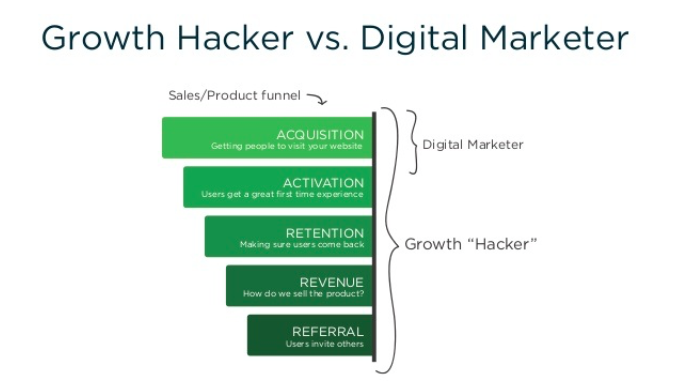Having a growth hacker on your team is not a new idea. In fact, it's 12 years old in July this year, coined by Sean Ellis on his marketing blog.
In fact, Sean recommended that, rather than hiring a VP of Marketing, a company should consider appointing a growth hacker instead.

Well, it's not just because 'growth hacker' is a cooler title. I mean, it's true I'd much rather say "Oh, that shady guy over there? Yeah, that's Greg, our ✨ growth hacker 💻".
But a growth hacker provides something no other job role does - an unparalleled, and unwavering, focus on growth. Every move they make is scrutinised by the potential it has for scalable growth. The person in the role will ask themselves before every decision "is this important for driving sustainable growth?"
Using their creativity, and analytical abilities, these individuals will be able to follow a growth hacking process of prioritising ideas, testing these ideas, and then understanding which ones to continue, and which to cut.
Woah, woah, woah. Slow down, you might be saying. It's all well and good knowing what a growth hacker is. But what is growth hacking in the first place? Well, I've got a quick definition for you right here:
Growth hacking is, basically, a term used for any strategy focused on growth, especially in regards to early-stage start-ups. This is usually who needs to see a large amount of growth, in a small amount of time.
Think small budget, small amount of time, big growth. So, growth hacking answers the question: "How can I gain as many customers as possible, with limited resources?" It's about focusing on the most cost-effective solutions.
Let's have a look at an example: Airbnb.
.png?width=247&name=download%20(19).png) Airbnb gave an option for anyone listing their property on their site the opportunity to post it on Craigslist. If they agreed, the listing would appear on both sites. Then, any clicks on the Craigslist site would be linked back to the original posting on Airbnb.
Airbnb gave an option for anyone listing their property on their site the opportunity to post it on Craigslist. If they agreed, the listing would appear on both sites. Then, any clicks on the Craigslist site would be linked back to the original posting on Airbnb.
On top of this, Airbnb combed through posts on Craigslist, contacting users. If they were looking to rent out their place, they would be sent an email tempting them to also list it on Airbnb.
So basically, they infiltrated Craigslist, and overtook 'em from the inside. Like a cool spy, or a parasite.
But let's jump back into it:
What is a growth hacker?
The primary goal of a growth hacker is to implement creative, cost-effective strategies to ensure their company can acquire and retain customers.
They will use a combination of methods to achieve this, including content and viral marketing, email marketing, SEO, and A/B testing. Using these, a growth hacker can enhance the business' growth potential.
So, everything they do has one single goal: to make the company's activity grow.
In order to do this, the individual needs to be willing to test, measure, and adjust the value proposition until they find the best way to reach their goal. These moves need to be creative and be made without using regular tools, such as Facebook ads and PR.
But a growth hacker has to be ruthless. They have to be able to make decisions and stop a move if it can't be proved it makes activity grow.
So, one of the key features of a growth hacker is that they work in all steps on the user funnel. Marketers may stay put in the acquisition level, but growth hackers go quite a bit deeper, even working on changes to the product itself.

The good news is that when you strip away everything that doesn’t have a direct impact on growth, a growth hacker should be easier to hire than a VP Marketing (or maybe an insider already has the needed skills). I’ve met great growth hackers with engineering backgrounds and others with sales backgrounds.
- Sean Ellis
Growth Hacking Skills
A growth hacker needs a wide variety of creative and analytical skills that combine to create a single, growth-hacking, decision-making machine. So, what are these roles, goals, and skills?
- Researching and understanding the company's long-term goals
- Pinpointing issues that are hampering growth
- Choosing and prioritising goals relating to growth
- Identifying growth opportunities for the company
- Designing experiments to test whether new moves will impact the business
- Implementing projects to achieve growth goals
- Using data, analytics and other tools to inform decisions
- Utilising resources to improve growth
- Reporting on initiatives and projects to higher-ups
- Replicating successful strategies at scale and in new markets
But is coding vital to the growth hacking role? Well, not necessarily. The ability to understand and leverage tech is important, but it's not a deal breaker.
For example, Rand Fishkin stated that: “The ability to code does not separate a marketer from a “growth hacker,” anymore than the ability to give excellent presentations on stage makes one a “speak marketer” or artistic skills transform a marketer into a “design marketer.””
How do Growth Hackers Work?
It's all about making business expansion happen, without spending a chunk of change. So, growth hackers will employ automation, data analytics, and creativity to achieve this aim. Attracting customers at the top stages of a funnel requires growth hackers to use creative and offbeat techniques, requiring them to use new ways to generate traffic.
But to achieve sustainable growth, and improve future outcomes, growth hackers need to figure out not only what works, but why it works.
So, they often use data to track customers along their journey down the pipeline and try to understand what causes the existing results, and how they can improve conversions at each stage. This means they have to explore the audience's expectations and satisfaction with their experience and offer to change the product or service to improve results.
But what makes these processes even more effective? Automation, of course. Then, growth hackers can repeat the cycle with a new hypothesis as many times as they need.
Why is Growth Hacking Vital?
Growth hacking is integral to the success of start-ups, or any business needing to save a little cash. This allows brands to expand their audience and boost revenue without costly marketing tactics. Growth hackers are always looking for low-cost ways to promote the company and eliminate a lot of spending.
Although, growth hacking can benefit bigger businesses too. Employing some basic hacking techniques can allow large enterprises to discover new audiences, improve ROI, and even increase customer loyalty.
Should a Hacker Remain a Hacker?
According to Sean, a hacker doesn't need to stay the same. Although this doesn't mean that all growth hackers should evolve into VPs of marketing.
"A VP of marketing needs to be able to help shape the overall company strategy, build and manage a marketing team and coordinate outside vendors among many other responsibilities. Some growth hackers will be great at this, while others will be bored out of their minds. The important thing to note is that without some proven scalable, sustainable ways of growing the business, these things will not matter."
How Can a Growth Hacker Benefit Your Business?
Bringing on board a growth hacker means introducing growth hacking into your company. This can see benefits such as:
- Flexibility
- The discovery of new business models, or product ideas
- The generation of qualified leads
- Building brand reputation and identity
- Cost-effectiveness and improved ROI
- Scalable marketing strategies
- The discovery of data-driven strategies
- Creating a data driven culture in your company
- Setting up an experimentation process and the mentality to follow through
- Building growth loops and systems
- Conversion rate optimisation
When Should You Hire a Growth Hacker?
Hiring a growth hacker at the right time will prove invaluable for your company. But grabbing one too early might make their job so difficult even the best candidate has trouble bringing results. So, you'll need a bit of infrastructure in place before you bring one aboard. This'll look like:
- A team working on your project
- A set company infrastructure and processes
- Initial indicators for product/market fit
- Dedicated funding
If you're missing one thing from this list, it'll be hard for the growth hacker to do their job. If there's no team to rely on, they can only do basic experiments.
If there's no company structure, they'll not have the right, direct contacts to work with. And we all know what happens when there's no funding. Your growth hacker won't be bringing in any money from day one, in fact, you can expect some returns from experiments to only start coming in a few months down the line.
